Letters and fashion plates from the time of Jane Austen
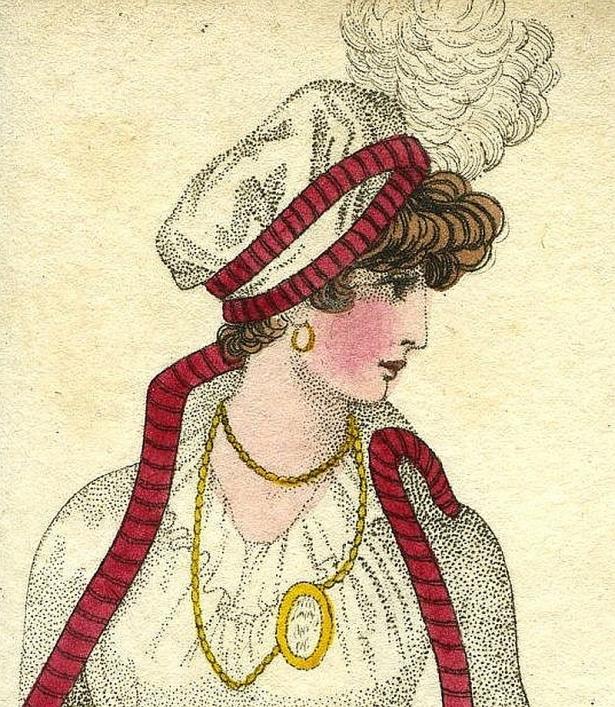
Some fascinating letters from a young Caroline Guille Le Marchant to her friends in Bath and London, from Edith Carey's Scrapbook, and some contemporary winter ladies costumes for Christmas, from two bound volumes of fashion-plates, entitled in French Figures. The plates are hand-coloured; some are from The Fashions of London and Paris, a monthly magazine that began publication in 1798, published by Richard Phillips.
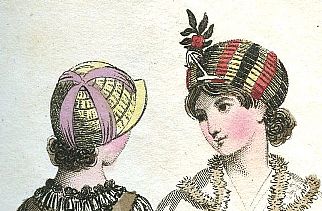
Extracts from letters (written between July 15th 1797 and April 28th 1798) from Caroline Guille Le Marchant* (daughter of Josias Le Marchant of La Haye du Puits) to Miss Elizabeth Chepmell, transcribed by Edith Carey on December 13th 1918. Caroline Le Marchant was born 12th May 1782, so was between 15 and 16 years of age when she wrote these letters.
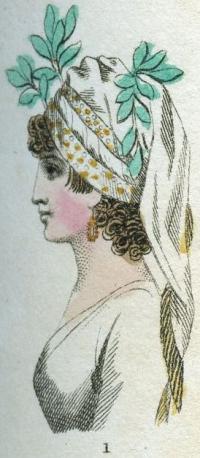
Guernsey July 25th 1797: I at last take up my pen to write to my dear Betsey who must think me very neglectful after my promise, indeed I think myself so. I suppose you have heard of our party at Whitsuntide and how much the Ladies of the Sociable [a ladies' club, the others were the 'Humdrum' and the 'Brilliant'] have talked of it, I think they would have done much better not to have taken any notice of it, they are very much hurt that we have deprived them of their beaux; they have also been pleased to give us many names. I suppose you have heard of one of our ships being taken on the road [the stretch of water between Guernsey and Herm] by an American, at least it went under that name, it was very bold of them to venture so near the Island, but they seem afraid of nothing, fortunately they did not keep the men long.
Nancy Coutart was married last Saturday to Major Barlow,¹ an officer of the 61st Regt, I don’t suppose you know him for the Regt is come but lately. She has been remarkably fortunate; it seems that the Colonel and him agreed one day that the first married should give up his house [?take over his house from EFC] to the other. The former says he had the idea of Major Barlow’s marrying here. Mr Brock’s family arrived here last Monday week, after having had a very long passage, we called to see them the Tuesday. We found poor Nancy very ill, as to Sukey I think she is the same. Emily told us that she had been unwell all the time she was at Bath. I am sure she must have found it very dull. I think she is grown thin. Lady Dalrymple² is expected in a fortnight, I am afraid that she will find it too late to begin her parties. I long very much for tomorrow to come, as we are to have a party at the Forest given us by Mrs Mollet. We are to drive on the cliffs, I dare say we shall spend a very pleasant day; this party consists of Lady Saumarez and her sister, Mr and Mrs Brock, and our family - We have also another party at Plaisances next Friday with young people; I dare say you will think us great gossips when I tell you of all our parties and and that we scarcely have a day to ourselves, which I assure you is the case; but however winter is coming on which will keep us at home. Please give our love to Miss Milgrove, Miss Herbert and the young ladies, and believe me my dear Betsey your most affectionate friend – Caroline G. Le Marchant.
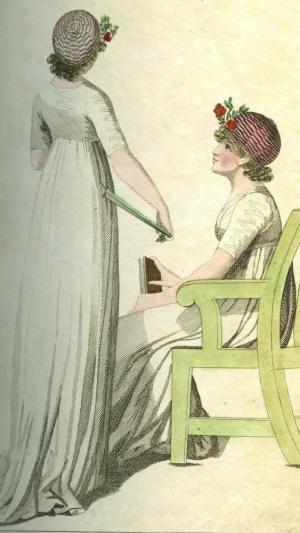
To Miss Chepmell, No 20 Marlborough Buildings, Bath.
Guernsey Sept. 20th 1797: I at last my dear Betsey take up my pen to answer yours of the 6th of last month. My reason for having deferred it so long was that I wished to give you an account of the Ball which the officers of the 61st gave. We staid there till 3 in the morning. We danced 6 dances and La Boulangère³ which is a round dance. I think it fatigues one very much. We were engaged for fourteen, if we had danced them all instead of 3 in the morning it would have been 3 in the afternoon.
There was not the vast confusion which made it remarkably pleasant. The Guernsey gentlemen return it next Tuesday. I dare say it will be more crowded. I have been told that the Rooms are to begin after the Ball. Lady Dalrymple has given 6 parties but out of the 6 we have been only 3 times, the weather being so bad as to prevent the Ladies from going. I think these parties are very pleasant. Nancy Brock has quite recovered her health. She does not go out at all, indeed, as you say, I don’t know how she can hinder herself from going out, especially to the Balls and Lady Dalrymple’s.
Our party meet every Sunday. We drink tea early and we walk after on the New Ground, but I suppose there will be no walking there long for the days shorten very fast. Your Mother came to drink tea here last Wednesday with the Ladies of her Society - We were to go last Sunday to drink tea at the Brock’s but the weather prevented our going. I suppose you have heard of Sophy Carey4’s sister being engaged to Captain Delancey and likewise of her brother George’s death? His illness was very short and very sudden. Last Tuesday there was a Rout at Mrs Borne’s, I did not go, for I have given up these large parties till next year when you return. I dare say you will be surprised for as I told you, in my last that I was such a gadder about and now I am quite the reverse. Harriet, as to that is not her case, she goes out almost every day. C. le M.
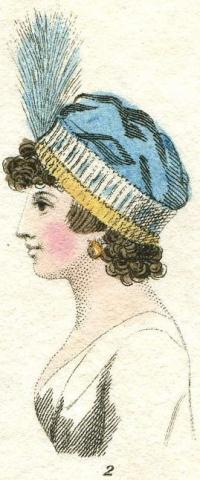
Guernsey December 12th 1797: Dear Betsey, I suppose you will be glad to know how time goes on with me, very messily I do assure you. We have had plenty of dancing lately, Mrs Mourant gave a dance last Tuesday week, we were 12 Ladies and gentlemen almost twice the number. We found it so very pleasant that we stayed till four o’clock the next morning, had you been there my dear Betsey you would have enjoyed it as much as I did. The Rooms have been very brilliant as far as here and I hope will continue so the remainder of the winter.
The 61st Regiment was ordered some time ago to Jersey, but fortunately they received fresh orders that they were not to go. I say fortunately, as they are most of them very genteel and pleasant young men and attend the Rooms every Tuesday, and as to the 81st they are such a shocking set, a few excepted, that when they come to the Rooms they are as tipsy as can be, which makes it very unpleasant, but the Governor has been informed of it, and since he has been at the Rooms, but does not stay very late, so that they watch him, and as soon as he is gone they come in as drunk and dirty as possible. Lady Dalrymple was very kind to them when first they came, she gave dances to introduce them to the ladies, but it was all to no purpose.
We were invited to another dance last Wednesday at Colonel and Mrs Hamilton’s, I did not go, for I had a cold and I thought it would only make it worse so I drank tea at the Brock’s with Mary and Harriet Carey and Patty Gore. But Harriet went with Mr Pottinger in the chaise and, in the evening they preferred walking back, as the horse-roads are so very bad from the fort to town. Time lies heavy upon me as my poor uncle has been with us this fortnight and for the present we expect his death every moment, which pains me very much.
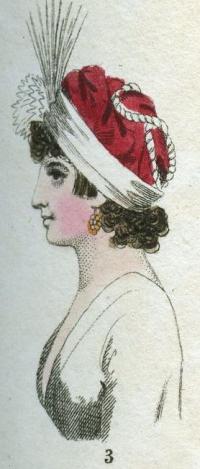
Guernsey Jan: 8th 1798: (give Harriet’s & my best love to Miss Herbert, Sophy Carey and you.)
Your work my dear Betsey has been very much admired. I had always forgot to tell you of it, and I suppose you will be very glad to hear it. I have not seen it since it is framed, but I do not doubt but what it looks very handsome being so well worked and done by the hands of such a perfect young lady as you are - I wish very much for your return! And expect to see you very much grown, notwithstanding you say you are not; within the last 3 months we have grown each half an inch which is pretty much.
I see my dear you are unacquainted with my dear Uncle’s death, he died the 11th of last month, the day after I had written to you (sic). His death was very sudden, he was only 3 days ill, as you say, we must all die sooner or later. Poor Mrs Dobrée [Marthe Mourant, Mrs Bonamy Dobrée] died last week, she has left 7 children to mourn her death, though they are very young and very likely not sensible of the loss they make in losing such a friend. It seems that the last words she said were to recommend her children to an old servant who has lived there some time. She said also that “She did not regret life.” I am not surprised at it; for I believe poor woman she had been very ill these last few years, it seems when she was taken ill she said she should not recover this time, for she did not feel as usual. Mr Mourant is very much affected, as is Mrs M. She has lost all her faculties and is not sensible of it. .... I suppose you don’t go to the Balls as often as to the play, you would not find it so pleasant, not being acquainted with many people and unless you dance it is not very agreeable to be only a spectator – and concerts? Do you attend these often this season? I suppose that you have heard that Mr Savery Brock has been appointed paymaster in the 49th Regt and Captain Carteret of the 81st, the former is gone to join his Regt which is at Norwich. I am very glad of it, for he had no employment in Guernsey and, suppose we have a Peace, which is very unlikely just now, he is to be on full pay the same as in war time, which is a very good thing for him; they say he will have about £300 or £400 a year, and Captain Carteret in peace time will be reduced to half pay. But I dare say notwithstanding he is very glad to be in this regiment for he has a brother in the same who is a lieutenant, and if they go to the West Indies it will be a comfort for them to be together for they say that the Regt is as likely to go there as any. I suppose you had heard that we had made a match of Betty Havilland and Savery Brock5, but it is quite off at present. C. Le M.
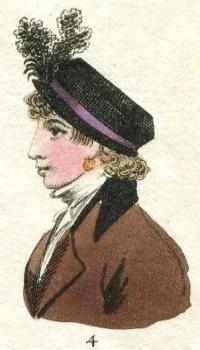
Guernsey Feb 21st 1798: With pleasure I sit down to answer yours. I suppose that by this time Miss Milgrove and Miss Herbert are returned from London and of course you have begun school. Mr and Mrs Bowden are gone to England, they went by the last packet on account of the former being very unwell, I am afraid it will be to no purpose. I did not see him before he went but those who did say he is so much altered that one could hardly know him again he is grown so thin. They are gone to Bristol. Lady Dalrymple has parties every Thursday, that is, she has strangers to dinner and in the afternoon she invites Ladies. They are very pleasant parties as there is generally a great deal of music; there is one Major Sharp(?) who plays extremely well on the flute; he accompanies those who play. She has been so kind as to give us a general invitation; we went there last Thursday, your Mamma and Mr Gunn were there. Patty Gore is gone to England with her Aunt Stephens as I suppose. You have heard, I dare say, she won’t find it so pleasant as she did Guernsey; they live 5 miles from Exeter, it seems it is a very retired place, so much so that they can’t even see the road6 .... Captain Carteret, who was paymaster with the 81st Regt has changed to the 37th which is a very good thing for him as it will never be broke, he is going to join it at Gibraltar.
There was a report some time ago that we was to have the Mortimarts [sic] but I believe it was a false one which I am very glad of for I don’t think it would be safe to have so many French troops in so small an island. It was also reported that the French were coming and that they were to be here on such a day & at such an hour, we have so often reports of that kind that now one does not think of it; it is not to be suppose that they would say the day that they should come had they any intention on these islands.
Mr and Mrs De Jersey are going to England in a short time to lead Mary to school. I believe it is London that they intend to go. I am surprised Mrs De Jersey will accompany her daughter, it will be a very hard parting for the latter. At least I judge by myself. I believe her motive in going is to judge of the school.7 Our party continues to meet on Sundays, as to us we are not very constant, time approaches for our Sunday walks on the New Ground. The Rooms continue to be very brilliant as yet, but I suppose after next month they won’t be very pleasant. Nancy Brock sends her love. C. Le Marchant.
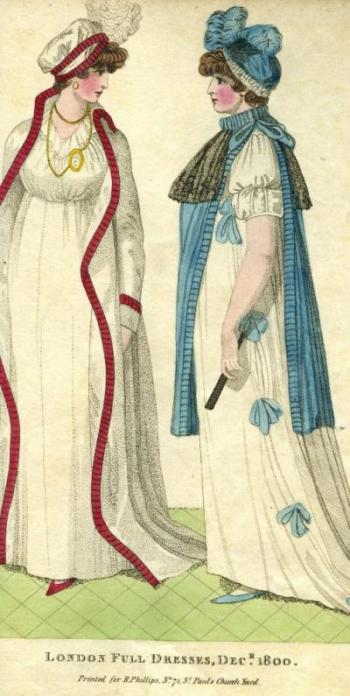
To: Miss Chepmell, at Mr Marett’s Wine Merchants,8 Milsom Street, Bath. April 28, 1798: I at last my dear Betsey am once more on English ground, after having had a very rough passage. But pray what does Miss Milgrove think of Mr Mansell and his Daughter? I assure you, though I was very sick on board the ship I could not help laughing sometimes to hear him. I dare say your father has given you an account of it. But (a propos) what do you think of this match of Amelia Gossling (sic) and Mr Mansell?9 As for my part I never was so surprised. I did not think she would have had him. As to the man himself I don’t think he is bad, but it’s the connections. Besides she is so young, for she is only 21 and very much admired by all the strangers who come in the island. It seems he asked her 2 years ago but she refused him. I have been told that he said he never would marry whilst Miss G. was single; one has talked of nothing else in Guernsey since it was made public. We went last night to Jones’s Royal Circus. I like London very much - I am going with Mamma to call on Mrs Brock, so adieu till my return. We called yesterday on Mrs Le Mesurier & Mrs. B. The latter invited us to dinner on Monday. I think she is genteeler than Mrs M. and much handsomer. Tomorrow we dine at Mr Bowerbank’s [a supplier to the Guille merchant trading business], they live at Hackney. We propose going to Drury Lane this evening to see a new play just come out—The Stranger.10 Mr Brock is to come with us. According to your Papa’s desire I shall give you some information of the place of our abode. We called on the Miss Shrapnell’s yesterday to settle with them. Which we have done; they are going to Balham Terrace; it is between Lambeth and Clapham, a very pleasant situation. We are to board with them, for 33 guineas a year each, every thing included, washing & wine excepted. We shall have a bedroom to ourselves but else in a family way. We can have music and dancing.—Direct your letters to me at Messrs Brock and Le Mesurier. I remain my dear Betsey your most sincere and affectionate friend Caroline G. Le Marchant.
See also a letter from the same year, written by Catherine De Sausmarez to her sister-in-law, Catherine De Havilland (rather older ladies).

*Caroline Guille Le Marchant was born in May 1782 and married James Carey (see note 4 below). She was daughter of Josias Le Marchant Jr., of La Haye du Puits, and Judith Ozanne, daughter of Jean. Her paternal grandparents were Josias Le Marchant Sr. (1718-1768) and Marie Bonamy, whose mother was a Brock. She died in 1861, having had several children. Above is a detail of the memorial inscription to her son, the Reverend John Carey, from the Castel Church, in which she and her husband are included.
1 John James Barlow, a friend of the Tupper family; it was on a voyage to Gibraltar with him that John Tupper drowned at sea in 1812, aged 20. The Barlow family had a long association of command with the South Gloucestershires. His brother Frederick, eventually Lieut.-Col. Barlow, married another Guernsey woman, [Catherine] Maria McCrea, Nancy Coutart's cousin, and died young leading the regiment at the Battle of Salamanca. A transcription of the diary of Frederick's daughter Jane is in the Libray.
2 Wife of the Governor, Hew Dalrymple.
3 La Boulangère is by coincidence the only dance mentioned by Jane Austen by name in her works. It is a French country dance of great antiquity and it usually forms the concluding dance of a ball, in the same way that Sir Roger de Coverley does in England. The gentlemen and their partners would place themselves in a circle, and join hands, with the gentlemen facing inwards, and the ladies outwards of the circle. They dance once round still keeping hands, and when they come back to their places, the leading couple begin the figure. When the party is very large, two couples may begin at the same time, one at the top and the other at the bottom of the room. After which the ladies dance the same figure.
The Basic Figure: by Elias Howe (1862) The gentleman with his right hand takes his partner's right hand, turns once round with her, and then leaves her. After which, with his left hand he takes the left hand of the lady next in rotation, turns once round in like manner with her, and then returns to his partner, to whom he gives his right hand as before, then his left to the lady standing next in the circle, and so on to the end, always alternately dancing with his partner, who in the meantime when he leaves her, is to continue to turn by herself inside the circle, and keeping as far as she can from him. When this couple arrive at their own place again, the whole number join hands as before, turn once round, and the next couple to the right dance the same figure. Information from the Streetwise Dance Archives.
4 Sophy Carey was one of the 14 children of Jean Carey of the Bigoterie (1740-1810) and Marie Le Ray. Her sister Mary married Jean Gaspard Le Marchant. Their brother George was 16 when he died in September 1797, about a week before this letter was written. Caroline Carey married John Delancey in November of the same year. According to Edith Carey in her Scrapbook I, p. 107, Sophy herself, reportedly a most charming girl, had not wanted to marry Peter Mourant of Candie 'but was forced into the match by her brother because he was rich. The man she had wanted to marry was a Mr or Sir F. Knollys, ancestor of the Lord Knollys and Miss Charlotte Knollys now about King Edward's court.' See 'Three refusals,' Quarterly Review of the Guernsey Society XX (4), Winter 1964, p. 87. The author of these letters, Caroline Guille Le Marchant, went on to marry James Carey, the eldest son of Jean Carey and Marie Le Ray, and brother to the above; he was born in 1768 and died in 1845.
5 John Savery Brock (1772-1844) was Sir Isaac Brock's next younger brother (of eight). In 1806 he married Elizabeth de Jersey (1787-1815). Ferdinand Brock Tupper in his Life and Correspondence of M.-G. Sir Isaac Brock tells how, as a young midshipman of eighteen, he was forced to retire from the navy after soliciting a petition from his fellow midshipmen in support of his opposition to 'mastheading' (a humiliating punishment which was later abolished). His brother procured him a job as paymaster of the 49th, but he was unhappy in this non-combat post and returned to Guernsey, where he served in the militia. He was tall (6'2") and 'high-spirited'. At the battle of Egmont-op-Zee in 1799 he acted as voluntary aide-de-camp where, reported his brother, 'nothing could surpass his activity and gallantry. He had a horse shot under him .... he has become the astonishment of all who saw him' (ibid., p. 16). Active in the political life of Guernsey, a little bit pompous, he was always seeking to improve the islanders' access to new technology in particular.
6 Mrs Stephens lived at Mount Wear, Topsham, Devon; unpublished Extracts from the Mann MSS, p.12. These extracts contain correspondence from several of the ladies mentioned in Caroline Le Marchant's letters.
7 'When about eleven years of age, my parents decided on sending me to school in England; and in 1802, accompanied by my uncle and aunt De Jersey, they conducted my cousin De Quetteville and myself to Keynsham... we found Mrs McGeary a very agreeable lady, and Mrs Randall, the teacher, equally so.' Memoirs of Margaret De Jersey Toase, 1859, p. 10 [née Dowdney, of Hauteville.].
8 Marett's was a business based in Jersey.
9 Edith Carey suggests that the Mr Mansell who was in love with Amelia Gosselin was Frederick Mansell (1775-1847), 'a very handsome man', son of Thomas Mansell, who owned a brewery in St. Peter Port. He had three sisters, Martha, (b. 1771), who married Peter Maingy in 1798; Jane (b. 1778) who married Nicholas Le Fèbvre, Sheriff of Guernsey, in 1799; and Mary Perchard Mansell, who was born in 1786, and married Capt. Thomas Power of the 55th Regiment; the Powers, although popular socially, were Irish and not considered top rank. Edith Carey suggests that Mary was the fellow traveller. Elizabeth Ham, who was related to the Mansells and whose sister Mary married Frederick's brother Henry, wrote in 1804 about Miss Mansell, whose wedding she attended:
She was neither good-looking nor clever; but her exuberant spirits, and the habit of saying what came uppermost, made her an object of considerable attention. Captain Power, her fiancé, must have been considerably older and from having lost his teeth looked older than he really was.
Frederick, who caused a good deal of trouble by stubbornly opposing the elopement of his brother Henry and Mary Ham, married Anne Lukis in 1802, and became a Jurat of the Royal Court and moved from the Pierre Percée to the large Vauxbelets estate. (His brother Tom married Anne's sister, Kitty Lukis.) His 'connections' may have caused him particular sensitivity on the subject; whether he lost Amelia Gosselin on account of them we do not know, but she married William Carleton Smythies of the 22nd Regiment, the son of Lady Affleck, only a year later, in 1799. Her rental book of 1813 is held at the Library.
'William Carleton Smythies, son of William Smythies of Oldland Hall in Oldland, co. Gloucester, in 1830, was born at New York in 1778 (Add. MSS. 19,149, to. 205). He was gazetted Cornet 6th (Inniskilling) Dragoons 18 August 1796 and was still serving in 1798, but his name disappears from the list of officers in 1799, and he evidently retired before marriage (Army List). He
married, 21 March 1799, Emilia Irving, daughter of Joshua Gosselin of Guernsey, and of Ware, co. Hertford, Esq. She died at Bath in 1858, aet. 82, and he died in 1853.' (Gosselin Pedigree, Twining and Smythies Family Papers.)
10 For Bowerbank, see Stevens Cox, G. The Guernsey Merchants and their World, 2009, p. 108; Thomas Bowerbank is recorded as having registered the arms of the De Jersey family on behalf of his wife, Elizabeth De Jersey (Bulletin Soc. Jers. XIV (1), p. 90). They saw what was to be Sheridan's last play, premiered in 1798.
